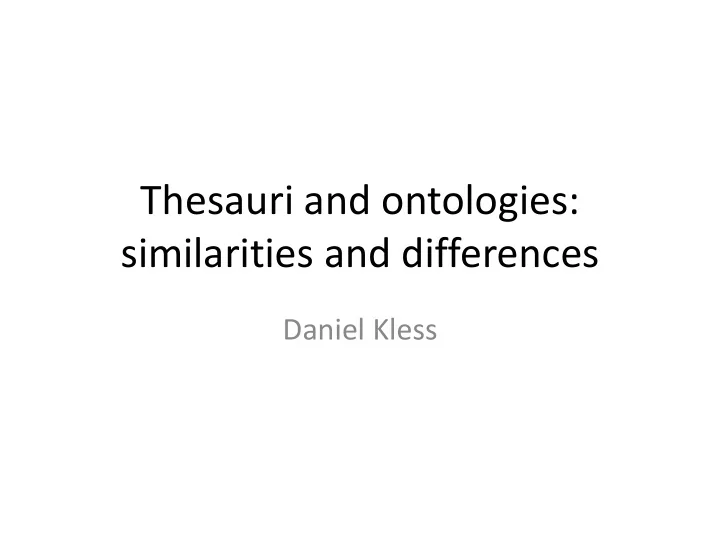

Thesauri and ontologies: similarities and differences Daniel Kless
Outline • Interpretations of Ontology – From Semantic Web to philosophy • Relata – the entities related by relationships – Concepts vs. Classes, Universals, Individuals and Collections • Relationships – Hierarchy, associations
Interpretations of „Ontology“ • Classical ontology – Plato, Aristoteles, Chisholm, Lowe • Formal ontology – Husserl, Hartmann – Top-level Ontologies (DOLCE, BFO, GFO, SUMO) • Complex Domain-Ontologies: ? Method ? – IAOA: Applied Ontology journal, FOMI, FOIS • Semantic Web: syntactic, data model
Outline • Interpretations of Ontology – From Semantic Web to philosophy • Relata – the entities related by relationships – Concepts vs. Classes, Universals, Individuals and Collections • Relationships – Hierarchy, associations
Approach Comparison of relata thesaurus vs. ontology • Based on entity definitions – Thesaurus: standard ISO 25964-1 – Ontology: Scientific realism (literature) • Mappings (not exhaustive) • Focus: Intensionality vs. extensionality of definitions
Figure 1 Results Comparison of relata thesaurus vs. ontology Formal ontology Thesaurus in ontological realism in standard ISO 25964-1 chair, animal Universal Set Concept vegetable, game Collection September 11 attacks Individual Document specific chair
Discussion Comparison of relata thesaurus vs. ontology • Distinction of concepts into universals and “other things” necessary to map relations • Difficult due to lack of definitions – unclear intension / intrinsic properties • Universals useful basis for reasoning
Outline • Interpretations of Ontology – From Semantic Web to philosophy • Relata – the entities related by relationships – Concepts vs. Classes, Universals, Individuals and Collections • Relationships – Hierarchy, associations
Approach Comparison of relationships thesaurus vs. ontology • Based on relationship definitions – Thesaurus: standard ISO 25964-1 – Ontology: Lowe (2005) + Paper by Bittner et al. (2004), Keet & Artale (2008) for part-of relations • Correspondences thesaurus ontology – Analysis with increasing level of detail • Focus: transitivity, categories of relata – Ontology categories: DOLCE (Gangemi et al. 2002), Lowe (2005) – Thesaurus categories: informal in standard – Mapping of categories … just word-meaning based
Thesaurus relationships Comparison of relationships thesaurus vs. ontology • Equivalence relationship • Hierarchical relationship (BT/NT) – Generic relationship – Hierarchical part-of relationship – Instance relationship • Associative relationship
Hierarchical part-of relationship Comparison of relationships thesaurus vs. ontology 1 st relata 2 nd relata Example Systems of the Organs of the body Cardiovascular system – body Blood vessels – Arteries Geographical Geographical Canada – Ontario – Ottawa location location Discipline or Discipline or field Science – Biology – Botany field of of discourse discourse Social entity Social entity Armies – Corps – Divisions Table 1
Associative relationship Comparison of relationships thesaurus vs. ontology 1 st relata 2 nd relata Example Operation or Agent or Crime investigation – Detectives process instrument Temperature control – Thermostats Action Action Weaving – Cloth product Ploughing – Furrows Action Patient or Harvesting – Crops Target Imprisonment – Prisoners Discipline or Object or Ornithology – Birds field of study phenomenon Forestry – Forests studied Table 2
Fundamental ontology relationships Comparison of relationships thesaurus vs. ontology Tomato Redness Specific Specific redness of a tomato tomato
Mereological ralations in ontologies Comparison of relationships thesaurus vs. ontology • Ground mereology (transitive, reflexive, symmetric) not always basis for linguistic part-of • Just some part-whole are transitive Table 1 (mereological relations) – Distinction of relationships requires categories (domain and range specification) here: DOLCE categories (top-level ontology)
DOLCE main categories Comparison of relationships thesaurus vs. ontology • Endurant… change over time, keep identity Figure 1 • Perdurant… do not change, no identity • Most relata categories of thesauri and Table 2 ontologies can be mapped
Comparison results: General relations Comparison of relationships thesaurus vs. ontology Table 3 Ontological Thesaurus relationship relationship Level Transitivity Hierarchical relationship Different n/a Non-transitive relationships Hyponymy / Generic Is-a Universal Transitive relationship Meronomy / Different part- Universal or Non-transitive Hierarchical whole Individual part-of relationship relationships Instance relationship Instance-of Betw. universal n/a and individual Associative relationship Different n/a Non-transitive custom relationships
Results: General relations Comparison of relationships thesaurus vs. ontology • Particular hierarchical part-of relations in thesauri match transitive ontological part-of relations Table 4 • Particular thesaurus associations generally match intransitive ontological relations Table 5
Discussion Comparison of relationships thesaurus vs. ontology • Transitivity does not hold across different (transitive) relationships, e.g. Plant reproductive organs Seed (hyponym) Kernels (meronym) Endosperm (meronym) Testa (meronym) Fruit (hyponym)
Discussion Comparison of relationships thesaurus vs. ontology • Thesaurus hierarchy appears – in one form or another – in ontologies as well appear similar – Need for detailing thesaurus relationships • Cursory usage of terms such as ‘class’, ‘instance’, ‘property’ or ‘category’ in definitions of thesaurus relationships, e.g. Geopolitical entity → Country → Canada Special structural importance in ontologies Inadequate to regard ontologies simply as a more formalized type of thesaurus
Discussion: Why are the differences Comparison of relationships thesaurus vs. ontology Purpose thesaurus relations Purpose ontology relations • Pointing indexers or • Predicating searcher to related, broader ( explain or account for or more specific phenomena of terms/concepts philosophical interest) • Allowing searchers and • Reasoning indexers to navigate a thesaurus • Automatic expansion of search queries
Discussion: Why transitivity? Comparison of relationships thesaurus vs. ontology • Automatic expansion of search queries over greater path lengths (thesauri) Lack of quantitative proof for suitability of relationship definitions • Maintainability
Discussion: Choose ontologies? Comparison of relationships thesaurus vs. ontology • Is-a relation diagonal/independent from part-of relation – Navigability possibly impeded (as opposed to thesauri) – Need for compensation in user interface • Logical structure often less familiar to users – Expect concepts in “traditional groupings” of disciplines and subject fields
Conclusions • Many apparent similarities • Difference in detail – Distinguishing relations – Fundamental structure (universal vs. individual) – Special importance of high-level categories – Definition of intrinsic properties** • No „easy“ mapping or reengineering possible, if goal is reasoning and wider integration
Recommend
More recommend